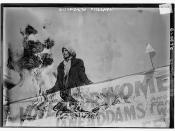In Salem, Massachusetts, witch trials begins to erupt as allegations are made on typical rivals. Arthur Miller portrays this event as a preposterous segment in our nation's history in his work called "The Crucible". In this extravagant play, Reverend Hale and Elizabeth Proctor take part in a drastic development that affects their entire role.
Reverend Hale distinctively alters his perspective of the situation of the witch trials throughout the play. He first approaches the reader in the beginning as a very haughty and selfish minister by proclaiming he will "find [the Devil] out ... and mean[s] to crush him utterly if he has shown his face" (39). He speaks of himself to be distinguishably more educated and courageous because he is a minister. Hale also speaks up as if he is completely confident in his theory of how people in Salem have been communicating with the Devil and how the trials are necessary.
Reverend Hale begins to realize the hysteria of the absurd accusations placed on innocent people and decides to speak up to Danforth about how he "cannot think ... to judge [a] man on such evidence" (91). In this transition phase, Reverend Hale starts to see the foolishness of how people have been throwing out statements that can strongly affect lives or even cause death. He begins to believe that there should be efficient evidence to send someone to jail for witchery. Hale then minimizes his insolence and undertakes a different point of view; into the eyes of the accused inhabitants of Salem. This reverend introduced as an incompetent minister finally confesses of his mistake, falsely claiming to "[bear] gifts of high religion" and tries to convince Elizabeth Proctor to "cleave to no faith when faith brings blood" for "God damns a liar less than he that...


